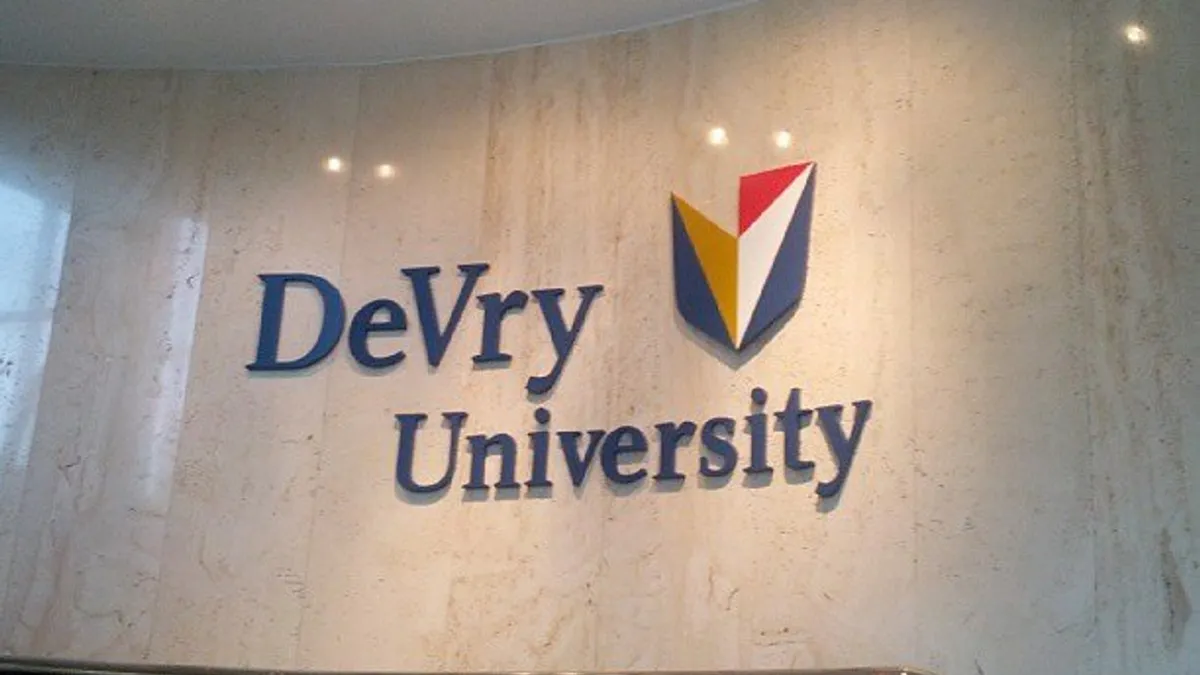What will 2015 bring for the for-profit college industry?
A major factor in the prognosis will be federal regulation. While a Republican-controlled Congress should help block an aggressive regulatory push by the Obama administration, the U.S. Department of Education’s gainful employment rule is set to take effect in July. The rule establishes minimum outcome standards related to student debt levels for programs that provide job training, including most for-profit colleges — and programs that don’t meet the standards are at risk for losing eligibility for federal student aid.
Here’s what may be in store for six of the larger for-profit college providers, according to analysts and the companies themselves:
Strayer Education
With the gainful employment rule on the way in 2015, some analysts give the for-profit college industry a poor outlook. According to TheStreet.com, stricter regulations for the industry and an improving economy, with fewer people returning to school to improve their skill sets, mean that the sector may not be worth investing in.
Seeking Alpha argues that the stronger regulations anticipated for for-profit educators, such as Strayer Education, will push student enrollments and revenues lower.
The company’s Strayer University had a 2014 fall-term enrollment of 42,189 students, down 2% from one year earlier. New student enrollments were down 5%. Strayer’s enrollment and annual revenues have been declining since 2010, when they were 60,700 students and $636.7 million, respectively. For 2013, the totals were 43,200 and $503.6 million. Strayer’s undergraduate and graduate degree programs are aimed at adult students in business administration, accounting, information technology, education, health services administration, public administration, and criminal justice.
According to TheStreet.com, Strayer Education stock was among the biggest gainers in the for-profit college sector in 2014, rising 109.8% in 2014, while DeVry Education Group gained 34.8%. Apollo Education Group was up 22%, and Capella Education climbed 12%.
DeVry Education Group
DeVry Education Group Inc. owns Advanced Academics, American University of the Caribbean School of Medicine, Becker Professional Education, Carrington College and Carrington College California, Chamberlain College of Nursing, DeVry Brasil, DeVry University, Ross University School of Medicine, and Ross University School of Veterinary Medicine. DeVry’s reported combined enrollment as of Sept. 30 was 245,172 in 2014, compared to 244,878 in 2013.
DeVry expects that its acquisition of Damásio Educacional, one of Brazil’s largest test preparation providers for the bar examination there and a provider of law programs, will close in Feburary 2015. The company’s management is predicting its medical/healthcare and international segments will increase their revenues at more than 10% over the next three to five years, starting in 2015.
Apollo Education Group
Apollo Education Group Inc. operates through Apollo Global, Carnegie Learning, College for Financial Planning, University of Phoenix, and Western International University subsidiaries, working in the United States, Europe, Africa, Australia, Latin America, Asia, and online.
Apollo Group Inc. formed Apollo Education Ventures this month, a venture capital platform for emerging companies developing innovations in higher education, professional development, and human capital management. Apollo Education Ventures will make minority investments, and it will use the Touchdown Ventures Inc. venture capital firm to help manage the platform, including help with deal sourcing, due diligence, and portfolio company management. Also in December, the company entered the Brazil market by acquiring a 75% interest in Sociedade Técnica Educacional da Lapa, operating educational programs as Faculdade Educacional da Lapa (FAEL).
In 2015 and beyond, Apollo’s focus on attracting controlling costs, attracting higher-quality students in the U.S. with help its prospects, according to Seeking Alpha. Apollo’s global expansion could help the company mitigate risk of stepped-up regulations in the U.S.
Education Management Corp
Education Management Corp. won a court victory regarding its debt restructuring plan in December, with a federal judge denying a request by Magnolia Road Capital and Marblegate Asset Management hedge fund managers to block the plan. The hedge funds own $20 million of EDMC's $1.5 billion in debt. If EDMC’s Aug. 27 agreement with its debtors is executed in 2015, the company's debt will be reduced to $400 million, lowering the 100% of common stock now owned by shareholders to 4%, with an opportunity to buy another 5%. The share price of EDMC’s stock dropped more than 97% in 2014.
Bridgepoint Education
Bridgepoint Education’s layoffs in November could signal that it expects its new student enrollments to continue to decline in 2015 for its Ashford University in Iowa, University of the Rockies in Colorado, and online programs. The company laid off 223 workers to better align its employee numbers with its enrollment numbers. At the end of 2013, the company had about 3,400 non-faculty employees. For Ashford, which has the largest enrollment of the Bridgepoint programs, enrollment dropped to 61,000 this year, down 10,000 from one year earlier.
Capella Education
Capella Education Company offers accredited online programs, including Capella University with about 35,000 students. Capella was approved by the U.S. Department of Education in November to offer non-term financial aid for direct-assessment programs. The direct-assessment programs, known as FlexPath, offer students the flexibility of progressing outside the traditional structure of credit hours by assessing their demonstrated competencies. To be eligible for financial aid disbursements, the students must meet time and academic progress requirements. Flexpath students will be transitioned to the non-term financial aid model starting in 2015. Capella claims to be the first university to offer competency-based bachelor's and master's degree programs with an approved direct-assessment learning model.
Would you like to see more education news like this in your inbox on a daily basis? Subscribe to our Education Dive email newsletter! You may also want to check out the 10 most popular Education Dive stories of 2014.






















